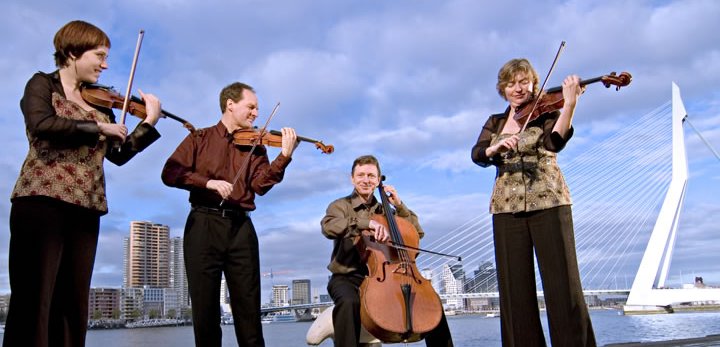Our regular listen to and look at living, breathing composers and performers that you may not know yet, but I know you should… And can, right here and now, since they’re nice enough to offer so much good listening online:
Katharine Norman (b. 1960 — UK, Canada)
 Katharine is a British-born composer, sound artist and writer, currently living about as far out West as you can get on Pender Island in BC, Canada. Prior to this “slightly alarming” (her words) change of direction she was Director of the Electronic Music Studios at Goldsmiths, University of London. She now supports the composing habit by freelance writing and some teaching. She’s composed instrumental music, music combining instruments or voices and digital media, and purely electronic work. Her music makes frequent use of documentary sound – conversation, city sounds, birds etc. – in a way that perhaps invites new appreciation both of the ‘real world’ and of the concert hall. Increasingly, she writes about music, in particular electroacoustic and electronic music. Her book of experimental writings on recent electronic music (of many kinds and approaches) entitled Sounding Art: Eight Literary Excursions through Electronic Music was published by Ashgate in 2004.
Katharine is a British-born composer, sound artist and writer, currently living about as far out West as you can get on Pender Island in BC, Canada. Prior to this “slightly alarming” (her words) change of direction she was Director of the Electronic Music Studios at Goldsmiths, University of London. She now supports the composing habit by freelance writing and some teaching. She’s composed instrumental music, music combining instruments or voices and digital media, and purely electronic work. Her music makes frequent use of documentary sound – conversation, city sounds, birds etc. – in a way that perhaps invites new appreciation both of the ‘real world’ and of the concert hall. Increasingly, she writes about music, in particular electroacoustic and electronic music. Her book of experimental writings on recent electronic music (of many kinds and approaches) entitled Sounding Art: Eight Literary Excursions through Electronic Music was published by Ashgate in 2004.
“I have been enthralled with sound as a means of expression ever since I discovered my violin playing made my parents cry (for all the wrong reasons). I started composing not long after, and in the last ten years or so have become more and more interested in the sounds that surround us, and what they can mean in different contexts. Although I remain fascinated by what computers can help me to do with sounds, technology is the least of my concerns – I’m trying to get somewhere, although happily the goal keeps moving. I’ll take whatever transport seems appropriate at the time, whether that’s works for sound alone, or piano pieces, or words on paper. But I will probably never write for solo violin.”
Katharine’s very welcoming site has a lot of peruse-worthy nooks and crannies, including some interactive pieces made especially for the web. The MP3 download section is being reworked, but luckily a lot of the recordings are parked at the SONUS website as well.
Ryan Brown (b. 1979 — US)
 Ryan is a San Francisco-based composer and performer, most frequently combining the two in the “rock chamber ensemble” OOGOG. His formative years were spent playing rock and jazz guitar in various bands before beginning formal musical studies at the age of 17. These early years continue to heavily influence his approach to composition, “[pushing] the ensemble sound beyond the Western classical realm” (Josef Woodard, Santa Barbara News-Press). He holds degrees in composition from Cal State Long Beach and the San Francisco Conservatory of Music and has studied with Dan Becker, Robin Cox, Michael Gordon, Martin Herman, Scott Johnson, David Lang, Steve Mackey, and Julia Wolfe. Recent commissions include music for violinist Todd Reynolds and the SFCM Guitar Ensemble. His work our friend adam for alto sax, electric guitar, electric bass, and piano received its East Coast premiere on Philip Glass’ MATA Festival at the Brooklyn Lyceum on March 20th.
Ryan is a San Francisco-based composer and performer, most frequently combining the two in the “rock chamber ensemble” OOGOG. His formative years were spent playing rock and jazz guitar in various bands before beginning formal musical studies at the age of 17. These early years continue to heavily influence his approach to composition, “[pushing] the ensemble sound beyond the Western classical realm” (Josef Woodard, Santa Barbara News-Press). He holds degrees in composition from Cal State Long Beach and the San Francisco Conservatory of Music and has studied with Dan Becker, Robin Cox, Michael Gordon, Martin Herman, Scott Johnson, David Lang, Steve Mackey, and Julia Wolfe. Recent commissions include music for violinist Todd Reynolds and the SFCM Guitar Ensemble. His work our friend adam for alto sax, electric guitar, electric bass, and piano received its East Coast premiere on Philip Glass’ MATA Festival at the Brooklyn Lyceum on March 20th.
Ryan’s generous “downloads” page will give you all kinds of listening, including the MATA piece for all you East-coasties who stayed home. (Be sure not to miss hearing the maniacally demented boogie-woogie piano of Oogog Says Hello.)
 Consider this:
Consider this:  I caught the second of “In Your Ear Redux” concerts at Zankel Hall with The Tensions Mountain Boys Saturday night, and I was happy I did!
I caught the second of “In Your Ear Redux” concerts at Zankel Hall with The Tensions Mountain Boys Saturday night, and I was happy I did! Why a String Quartet? What is it that has given it its exalted reputation and mystique? Why have so many composers regarded it as the perfect medium of expression, though it is perhaps the most demanding to write for? And why do distinguished artists often prefer to work as a team in a first class quartet rather than make bigger money as, say, orchestral leaders? Music means different things to different people: but for those to who music is an intellectual art, a balanced and reasoned statement of ideas, an impassioned argument, an intense but disciplined expression of emotion – the string quartet is perhaps the most satisfying medium of all.
Why a String Quartet? What is it that has given it its exalted reputation and mystique? Why have so many composers regarded it as the perfect medium of expression, though it is perhaps the most demanding to write for? And why do distinguished artists often prefer to work as a team in a first class quartet rather than make bigger money as, say, orchestral leaders? Music means different things to different people: but for those to who music is an intellectual art, a balanced and reasoned statement of ideas, an impassioned argument, an intense but disciplined expression of emotion – the string quartet is perhaps the most satisfying medium of all.

 Juan Hidalgo’s
Juan Hidalgo’s